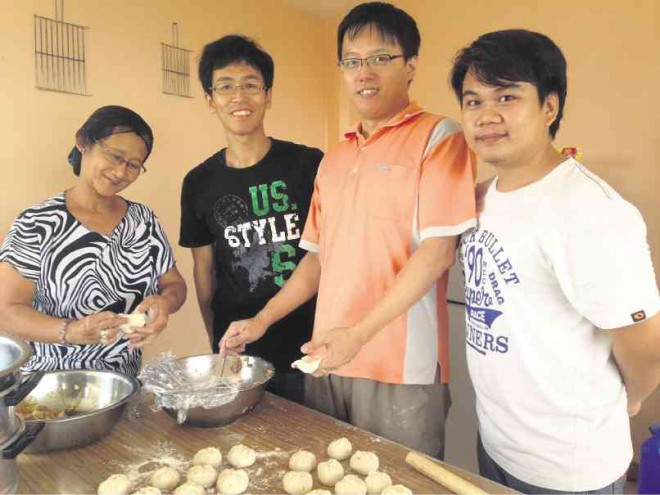
TAIWANESE social workers Liu Ming-hao and Yao Fen-zhi (in the middle), help volunteers of Bukluran Multipurpose Cooperative train poor women in starting up a small business of “baozhi” and shortcake-making in Cavite. MARICAR CINCO
DASMARIÑAS CITY—Taiwanese social workers Liu Ming-hao and Yao Fen-zhi, say they may never get used to Filipino food, finding the dishes delicious but either too salty or too sweet.
So one day, while at the community center of Bukluran Multipurpose Cooperative (BMPC) in Dasmariñas City in Cavite province, the two decided to prepare their own lunch—the baozhi or baozi.
Baozhi is steamed bun stuffed with ground meat or vegetables. It is smaller than the Filipino siopao but bigger than the Chinese siomai (dumplings).
What’s intriguing, though, is the stuffing of the vegetable baozhi: sotanghon noodles with bits of chopped cabbage and carrots.
“It is (called) siopao in Hong Kong, and baozhi in Taiwan,” Yao points out. Baozhi, he says, is also popular in parts of mainland China.
Very easily, the baozhi satisfies Filipino taste buds, at least of those at BMPC that Catholic nun Marilena Narvaez has decided to include it in the list of food products being prepared and sold by the Cavite-based cooperative. Narvaez, who belongs to Sisters of Social Service, serves as coordinator of BMPC’s livelihood projects.
Poor communities
BMPC provides livelihood skills training to women in the poor communities in the province. Established in 1995, it now has 2,466 members.
In August, Narvaez invited Liu, 35, and Yao, 36, both pursuing doctoral degrees on social work at Chi Nan University in Puli, Taiwan, to teach BMPC members on baking shortcakes filled with pineapple, ube and gabi.
The two are not cooks though. Liu, who is also a photography professor, holds a state license to teach unemployed women basic cooking techniques. Yao, on the other hand, heads a cooperative called the Association of Taoyuan in Taipei.
As an academic requirement, Yao says the university wanted him and Liu to conduct a study on a business model of social work in underprivileged communities in English-speaking countries, so they may also train in the foreign language.
Funding
“But (language) is not our (primary) purpose. We are social workers. We want to find the poor and the uneducated,” Liu cites as one reason for choosing the Philippines.
“We (Taiwan and Philippines) are also neighbors. We want to do things for our neighbor,” Yao adds.
At least three women from Dasmariñas have been trained in cooking baozhi and baking. One of them, Elvira Lacson, 48, used to run a small mami (noodle) stand but is currently unemployed. Her husband, a company driver, does not earn much for the family.
“It’s delicious and looks like it’s easy to sell,” Lacson says of the baozhi. A piece is also filling enough, “you may need not eat rice anymore for a meal,” she adds.
For less than P200 worth of ingredients (dough, vegetables or meat), one could make 20 pieces or more of the baozhi. The cooperative sells a piece (stuffed with meat) for P18 apiece and a vegetable baozhi for P15 (both weighing at least 30 grams).
For the shortcakes, BMPC plans to sell a box of nine for P200. For every 20 boxes sold, each member could earn P375.
“The (main) ingredients used are (abundant) here in Philippines. There are no preservatives so they are healthy,” Liu says.
Narvaez says the first few samples were sold during a church event in Imus City last month, where they earned as much as P10,000.
However, she says, the cooperative’s budget for production had not been enough to purchase commercial equipment for baking and packaging so they applied for funding from the Department of Trade and Industry.
Liu and Yao returned to Taiwan after giving a presentation of their products to local government employees in Cavite during the celebration of the cooperative month in October. They also left some P70,000 worth of cooking equipment at the BMPC center for the members.
Narvaez said the cooperative found a market for the shortcakes in business districts in Manila. This holiday season alone, it has already taken orders for about 4,000 pieces of the pineapple shortcakes.
The baozhi, on the other hand, was a hit in Cavite, especially in the poor communities in Dasmariñas and Imus cities.
“Imagine you could already have lunch for just P15, when it’s (a meal) like P42 in (convenience stores),” she said.